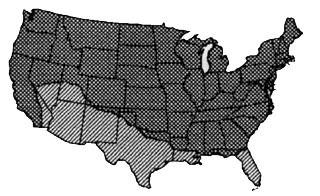Greenhouse
| Container .............. | Flats or tool carts, 31x62x7.5cm deep | |||||||||||||||||||||
| Media ................... | Not critical | |||||||||||||||||||||
| Temp/Light ............ | 18 to 24°C; daylength not critical | |||||||||||||||||||||
| No. of Plants ......... | 20 to 25 per replication | |||||||||||||||||||||
| No. of Reps ........... | 4 minimum | |||||||||||||||||||||
| Other .................... | Inoculate with Rhizobium meliloti Dang
and fertilize as needed. No insecticide within 1 week of inoculation |
|||||||||||||||||||||
| INOCULUM CULTURE | ||||||||||||||||||||||
| Source .................... | Infected leaves | |||||||||||||||||||||
| Storage.................... | 6 months at 4°C; longer on silica gel | |||||||||||||||||||||
| INOCULATION PROCEDURE | ||||||||||||||||||||||
| Age of plant ............. | 6 to 8 weeks | |||||||||||||||||||||
| Type of inoc............. | Sporulating oatmeal agar plate cultures;21 to 30 days old | |||||||||||||||||||||
| Temp/Light .............. | 19 to 23°C; dark | |||||||||||||||||||||
| Method ................... | Cultures inverted 30 to 60 cm above plants, approximately one culture per 900cm2 of plant material, in place until 10 spores per cm2 collected on trap slides, usually 15 to 24 hours; plates repositioned periodically to increase uniformity of deposition; plants are sprayed with water after plates are removed |
|||||||||||||||||||||
| Time of Inoc............. | Usually 24 to 48 hours | |||||||||||||||||||||
| Conditions ............... | Saturated RH; 19 to 21°C; dark | |||||||||||||||||||||
| INCUBATION | ||||||||||||||||||||||
| Duration .................. | 72 hours at 100% RH in mist chamber | |||||||||||||||||||||
| Location................... | After initial 72 hour period, move from moist conditions to greenhouse, allow leaves to dry slowly out of direct sunlight | |||||||||||||||||||||
| Measurement .......... | Type and size of leaf spot, usually 14 days after inoculation | |||||||||||||||||||||
| RATING | ||||||||||||||||||||||
| 1 Resistant.............. | No spots | |||||||||||||||||||||
| 2 Resistant ............. | Barely visible pepper spots, 1 mm diam or less | |||||||||||||||||||||
| 3 Susceptible .......... | Spots >1 mm, no chlorosis | |||||||||||||||||||||
| 4 Susceptible .......... | Spots >2 mm, chlorosis or defoliation | |||||||||||||||||||||
| 5 Susceptible .......... | Spots >3 mm, chlorosis, defoliation, with or without fruiting structure (apothecia) in center of lesion. | |||||||||||||||||||||
| CHECK CULTIVARS | ||||||||||||||||||||||
DISTRIBUTION AND SEVERITY OF Common Leafspot Pseudopeziza medicaginis Lib.
Sacc.(Click on the map above for a larger version.
|
||||||||||||||||||||||
| SOURCE OF INOCULUM AND SCIENTIST WITH EXPERTISE | ||||||||||||||||||||||
| Name ..................... | K.T. Leath | |||||||||||||||||||||
| Address................... | USDA-ARS U.S. Regional Pasture Research Lab University Park, PA 16802 |
|||||||||||||||||||||
| Phone ..................... | 814-863-0945 | |||||||||||||||||||||
| CORRELATION TO FIELD REACTION Correlation to field results is good; no exceptions reported. |
||||||||||||||||||||||
| RACES | ||||||||||||||||||||||
No races are known.
CULTURE OPTIONS AND RANGE OF CONDITIONS
INOCULATION CONDITIONS AND RANGE OF CONDITIONS
HELPFUL INFORMATION REFERENCES |
||||||||||||||||||||||
